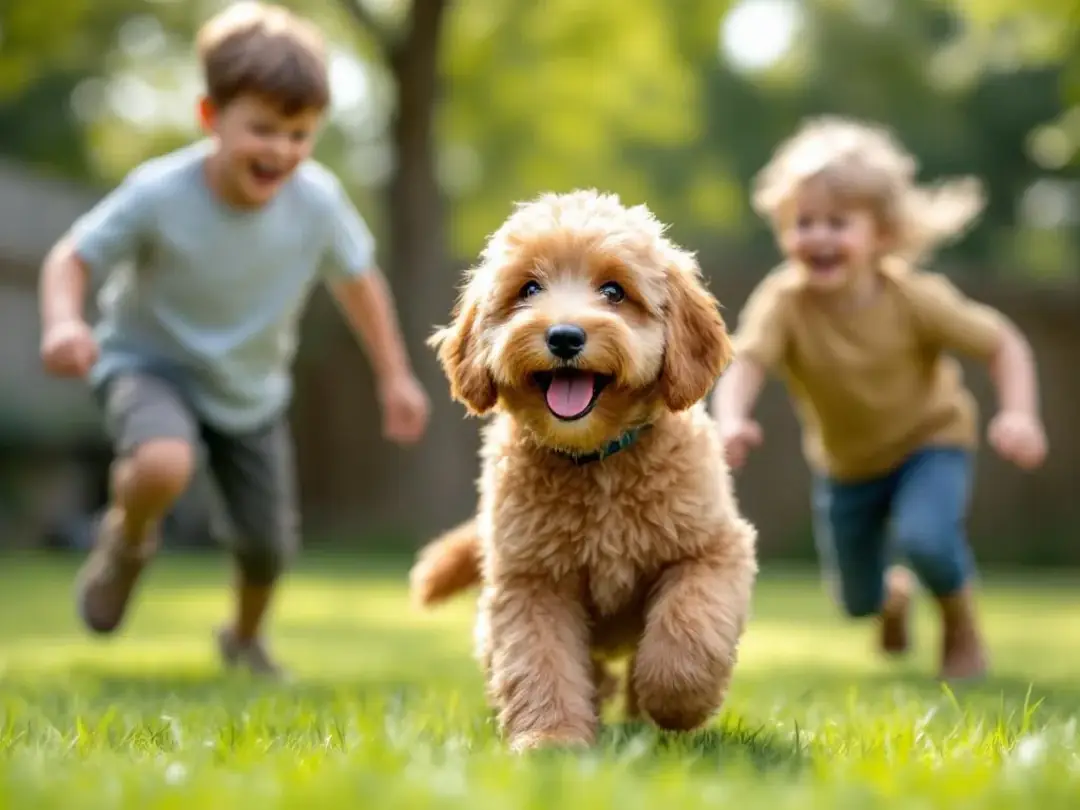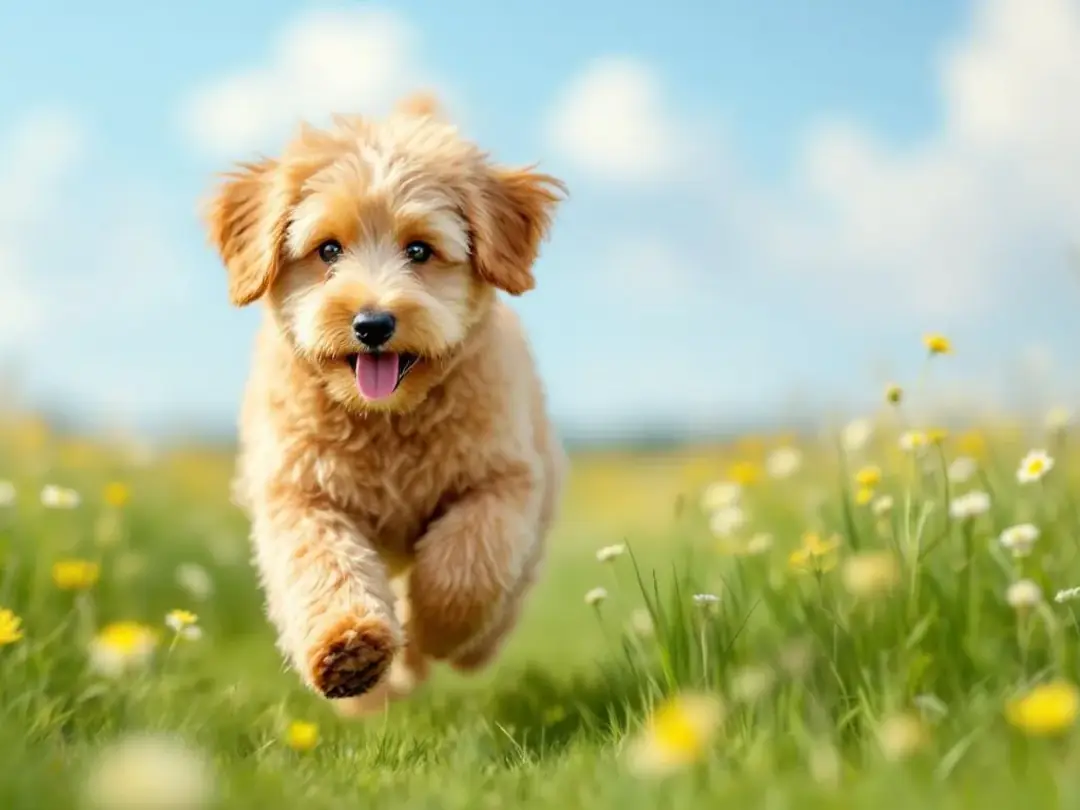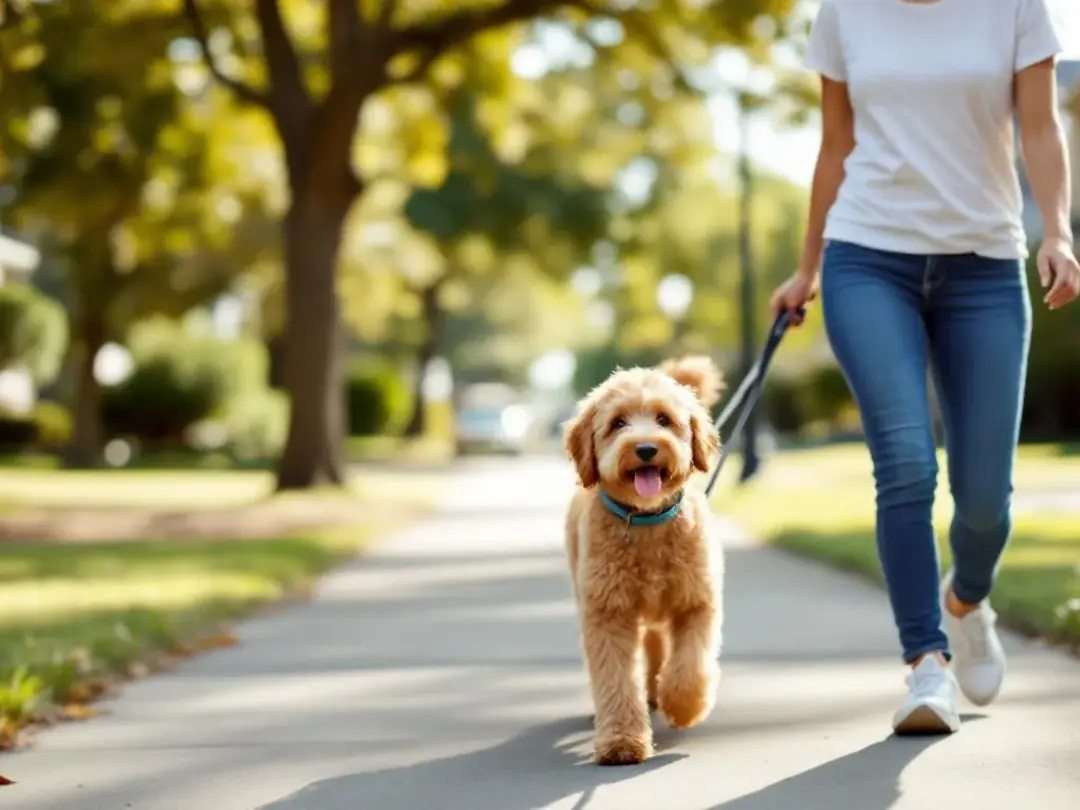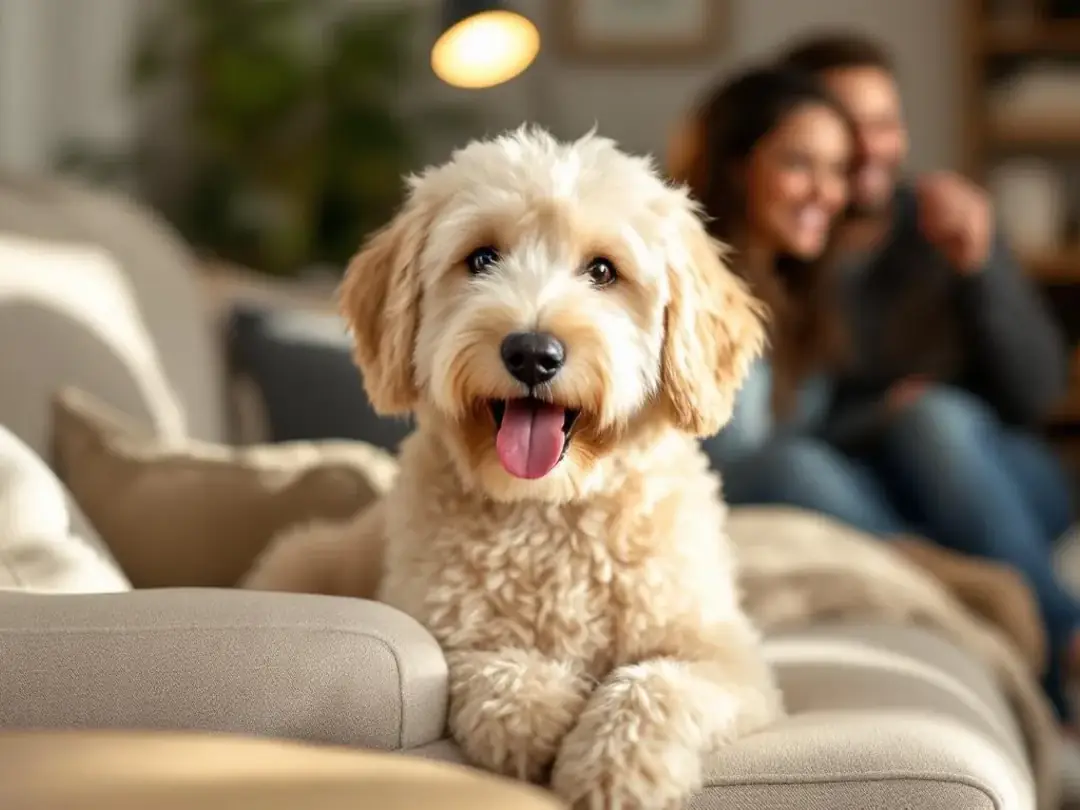Key Takeaways
-
Miniature English Goldendoodles weigh 15-35 pounds and stand 13-19 inches tall, making them ideal for smaller living spaces
-
They combine the calm temperament of English Cream Golden Retrievers with the intelligence and hypoallergenic coat of Poodles
-
These dogs are excellent for families with allergies due to their low to non shedding coats
-
F1B generation (75% Poodle) offers better allergy-friendliness while F1 generation (50/50 mix) retains more Golden Retriever traits
-
They require moderate exercise with 30-45 minute daily walks and make excellent therapy dogs
What is a Miniature English Goldendoodle?
A miniature english goldendoodle is a carefully planned cross between an english cream golden retriever and either a miniature poodle or toy poodle. This intentional breeding produces dogs that typically weigh between 15-35 pounds and stand 13-19 inches in height, creating the perfect companion for families wanting golden retriever temperament in a more manageable size.
The term 'mini goldendoodle' is often used for both American and English lines, but there are important distinctions in temperament and appearance between the two.
The distinction between english goldendoodles and their American counterparts lies in the parent breed selection. English golden retrievers tend to have calmer temperaments, stockier builds, and that distinctive cream coloring that many families find irresistible. When crossed with poodles, these traits combine to produce mini english goldendoodles with notably polite and laid-back personalities.
This compact size makes them an excellent choice for:
-
Apartment and condo living
-
Families with young children who might be overwhelmed by larger dogs
-
Seniors wanting an active but manageable pet
-
First-time dog owners seeking an intelligent, trainable breed
-
Multi-pet households where space considerations matter
Some breeders also offer a 'medium' size, sometimes called Moyen (Medium) Doodles, which is larger than the miniature but smaller than the standard, typically weighing 35-50 pounds and standing 18-21 inches tall.
Unlike standard goldendoodles that can weigh 60-90 pounds, mini english goldendoodles offer all the beloved characteristics of their larger cousins in a package that fits comfortably into modern family life. Their size also makes them easier to transport, groom, and manage during training sessions.


Breed Characteristics and Temperament
The temperament of mini english goldendoodles consistently ranks among their most appealing qualities. These dogs inherit the calm, polite nature of english golden retrievers combined with the remarkable intelligence that poodles are famous for. The result is a dog that's naturally well-mannered, eager to please, and surprisingly intuitive about family dynamics.
Families with children find these dogs particularly wonderful because they seem to instinctively understand how to interact gently with young age kids. Their patient nature makes them excellent with special needs family members, and many mini english goldendoodles naturally develop into exceptional therapy dogs without formal training. In addition to their success as therapy dogs, some mini english goldendoodles are also trained as service dogs, providing emotional support or assistance with specific tasks for individuals with unique needs.
Their intelligence shines through in daily interactions. These dogs learn household routines quickly, pick up on family emotions, and respond beautifully to positive training methods. Unlike some breeds that can be stubborn or independent, mini english goldendoodles genuinely want to make their families happy.
Key temperament traits include:
-
Social and friendly with both family members and strangers
-
Alert but not aggressive - they'll notify you of visitors without excessive barking
-
Playful yet calm - they enjoy games and activities but settle nicely for quiet time
-
Adaptable to different family structures and living situations
-
Gentle with other pets when properly socialized
The english cream golden retriever influence particularly shows in their relaxed approach to life. While they're certainly playful and enjoy walks and games, they're not the hyperactive type that requires constant entertainment. This makes them perfect for busy families who want an engaged pet without feeling overwhelmed by endless energy demands.


Physical Appearance and Coat Types
The teddy bear appearance of miniature english goldendoodles never fails to capture attention. The classic doodle look is characterized by a plush, often fleecy coat, a round face, and unique features that set them apart from other breeds. Their round faces, sweet eyes, and compact, sturdy build create an irresistibly cuddly appearance that only gets more charming as they mature from puppies into adults.
The stocky build inherited from english golden retrievers gives these dogs a substantial feel despite their smaller size. They don't appear fragile or delicate - instead, they have the athletic build of dogs bred for active family life, just in a more compact package. The placement and appearance of their ears, which hang close to the cheeks and frame the face, add to the breed's overall charm and distinctive look. Their tail is set low and carried with a gentle curve, closely resembling the tail of the English Golden Retriever, further enhancing their teddy bear resemblance.
Coat types vary depending on which parent's genetics dominate, but all variations tend to be lower-shedding than typical golden retrievers:
Straight to Wavy Coats (F1 Generation)
-
Softer texture than purebred golden retrievers
-
Moderate shedding reduction
-
Easier maintenance but requires regular brushing
Fleecy/Wavy Coats
-
Loose waves throughout
-
Good balance of low shedding and manageable grooming
-
Often considered the ideal coat type for families
Curly Coats (F1B Generation)
-
Tight curls similar to poodle coats
-
Highest level of hypo allergenic qualities
-
Requires more intensive grooming but minimal shedding
Colors range beautifully across the spectrum, with cream and champagne being most common, followed by apricot and occasionally red. The english cream golden retriever parent typically contributes lighter tones, while poodle genetics can introduce variations. Some multigen litters may even produce rare patterns such as merle, which are highly sought after for their unique appearance. Some litters may produce brown or other colors, though these are less common.
The coat continues developing until dogs reach full maturity around 18-24 months. Many owners notice their new puppy's coat becoming more textured and defined as the adult coat comes in during this transition period.
Different Generations Explained
Understanding goldendoodle generations helps families choose the right match for their specific needs, particularly regarding allergies and coat characteristics.
F1 Generation (First Cross) This represents a 50/50 cross between an english golden retriever and a poodle. F1 mini english goldendoodles often retain more of the golden retriever's temperament traits while gaining some coat benefits from the poodle side. Standard Goldendoodles are produced by crossing an english golden retriever with a Standard Poodle, resulting in larger offspring. They tend to have moderate shedding reduction and are often the best choice for families who want maximum golden retriever personality.
F1B Generation (Backcross) Created by breeding an F1 goldendoodle back to a poodle, resulting in 75% poodle genetics and 25% golden retriever. These dogs typically have curlier coats, better hypoallergenic qualities, and require more grooming. They're the excellent choice for families with significant allergies.
Multigen Varieties Some breeders work with multiple generations, breeding goldendoodles to other goldendoodles with careful attention to maintaining health and temperament. These can offer more predictable traits but require experienced breeding programs.
| Generation | Poodle % | Golden Retriever % | Coat Predictability | Allergy-Friendly Rating |
|---|---|---|---|---|
| F1 | 50% | 50% | Moderate | Good |
| F1B | 75% | 25% | High | Excellent |
| Multigen | Varies | Varies | High | Varies |
| The choice between generations often comes down to priorities. Families dealing with severe allergies typically prefer F1B dogs, while those wanting maximum golden retriever temperament might choose F1. When choosing a generation, expect that F1B and multigen litters will generally have curlier, more predictable coats with less shedding, while F1 litters may have a wider range of coat types and moderate shedding. Both produce wonderful family companions - the difference lies in coat management and allergy considerations. |


Health Benefits and Hybrid Vigor
One of the most compelling reasons families choose mini english goldendoodles is the significant health advantages that come from crossing two distinct breed lines. This phenomenon, called hybrid vigor, often results in healthier, longer-lived dogs compared to their purebred parents.
Golden retrievers, while wonderful dogs, unfortunately have relatively short lifespans of 7-8 years on average, primarily due to high cancer rates. English golden retrievers tend to live slightly longer than american golden retrievers, but the breed still faces health challenges. When crossed with poodles - known for their longevity and different health profile - the resulting mini english goldendoodles often enjoy lifespans of 12-15 years or more.
Responsible breeders health test both parents for common issues:
-
Hip and elbow clearances with specific screening for healthy hips to reduce dysplasia risks
-
Eye examinations to screen for progressive retinal atrophy and other inherited conditions
-
Heart clearances ensuring cardiac health
-
ICH testing (Ichthyosis) particularly important for golden retriever lines
-
DNA panels screening for breed-specific genetic conditions
The english cream golden retriever parent often contributes additional health benefits. These European lines were bred with different priorities than american golden retrievers, often emphasizing longevity and structural soundness over field performance. This tends to produce dogs with:
-
Lower cancer rates compared to American lines
-
Better hip and elbow scores on average
-
More robust overall constitution
-
Calmer temperaments that may contribute to stress-related health benefits
Quality breeders typically offer health guarantees covering major genetic conditions for the first few years of the dog's life. Reputable breeders provide guarantees for their pups, covering major genetic conditions including those affecting hips and joints. This protection, combined with the natural advantages of hybrid vigor, gives families confidence in their long-term companion's health prospects.


Exercise and Training Requirements
Mini english goldendoodles strike an ideal balance between being active enough to enjoy family adventures while being calm enough for relaxed home life. Their moderate energy levels make them perfect for families who want an engaging pet without feeling overwhelmed by exercise demands.
Most adult dogs thrive with two walks totaling 30-45 minutes daily, plus some playtime or mental stimulation. This might include:
-
Morning and evening walks around the neighborhood
-
Yard play sessions with fetch or tug games
-
Weekend hiking or longer exploration outings
-
Swimming when introduced at a young age (they often inherit water-loving tendencies)
Their intelligence makes training particularly rewarding. These dogs want to please their families and respond beautifully to positive reinforcement methods. Many owners find that basic obedience comes naturally, with house training often progressing faster than expected.
Training strengths include:
-
Quick learning of household routines and expectations
-
Excellent recall when properly trained (retriever genetics help here)
-
Natural social skills making them easy to train around other dogs and people
-
Problem-solving abilities inherited from both parent breeds
-
Eagerness to please that makes them responsive to gentle correction
Mental stimulation proves just as important as physical exercise for these intelligent dogs. Puzzle toys, training sessions, and interactive games help prevent boredom-related behaviors. A tired mind often means a well-behaved dog, and mini english goldendoodles particularly benefit from activities that engage their natural problem-solving instincts.
First-time dog owners often find these dogs forgiving of training mistakes while still being responsive enough to learn proper boundaries and expectations.
Ideal Family Situations
The versatility of mini english goldendoodles makes them suitable for an remarkably wide range of family situations. Their size and temperament combine to create dogs that adapt well to different lifestyles while maintaining their essential sweetness and intelligence.
Families with Allergies The hypoallergenic qualities inherited from poodle genetics make these dogs possible for many families who previously couldn't consider pet ownership. While no dog is truly 100% allergen-free, the reduced shedding and different dander characteristics often work well for mild to moderate allergy sufferers.
First-Time Dog Owners The combination of intelligence and eager-to-please temperament creates an forgiving learning experience for new dog owners. These dogs typically communicate their needs clearly and respond well to consistent, kind training approaches.
Families with Children The patient, gentle nature inherited from english golden retrievers makes these dogs naturally wonderful with children of all ages. They seem to instinctively understand how to interact appropriately with young family members while still being playful enough to engage in games and activities.
Senior Companions The manageable size combined with moderate exercise needs creates an ideal companion for older adults who want an engaging pet without overwhelming physical demands. Many seniors find the calm, intuitive nature of these dogs particularly comforting.
Therapy and Service Work The natural empathy and trainability of mini english goldendoodles make them excellent candidates for therapy work. While their smaller size limits some service dog applications compared to standard goldendoodles, they excel in emotional support and specific assistance roles.
Urban Living Apartment and condo dwellers appreciate dogs that adapt well to smaller spaces while still being active enough for city adventures. Their polite nature makes them good neighbors, and their size makes transportation and management easier in urban settings.
The key to success with any family situation is matching the dog's energy level and needs with the family's lifestyle and commitment to training, exercise, and grooming.
Choosing a Reputable Breeder
Finding the right breeder makes the difference between years of joy with a healthy, well-adjusted companion and potential challenges with health or temperament issues. Quality breeders invest significantly in health testing, early socialization, and matching puppies with appropriate families.
Essential Health Testing Reputable breeders test both parents for relevant genetic conditions and provide documentation of results. This should include:
-
Hip and elbow scoring through appropriate registries
-
Eye clearances from board-certified veterinary ophthalmologists
-
Heart clearances confirming cardiac health
-
DNA testing for breed-specific conditions
-
Current health certificates for both parents
Early Socialization and Training Quality breeding programs expose puppies to various experiences during their crucial early weeks. Look for breeders who provide:
-
Exposure to different surfaces, sounds, and experiences
-
Basic handling and grooming introduction
-
Some level of house training foundation
-
Interaction with different people and potentially other animals
-
Early neurological stimulation programs
Red Flags to Avoid
-
Breeders who won't provide health testing documentation
-
Multiple litters available simultaneously without adequate staff
-
Puppies that seem fearful, overly shy, or show signs of poor health
-
Reluctance to let you meet the mother dog
-
Pressure to purchase immediately without proper consideration time
-
Prices significantly below or above reasonable market ranges
Questions to Ask Potential Breeders
-
Can you provide copies of health clearances for both parents?
-
What early socialization experiences do puppies receive?
-
What type of health guarantee do you offer?
-
Can I meet the mother dog and see where puppies are raised?
-
How do you match puppies to families?
-
What ongoing support do you provide to puppy families?
Quality breeders often have waiting lists and invest considerable time in getting to know potential families. Reputable breeders also announce upcoming litters in advance, allowing families to plan and apply for future puppies. They typically want to ensure good matches and may ask detailed questions about your lifestyle, experience, and expectations. This thorough process, while sometimes lengthy, usually results in better outcomes for both families and dogs.
The investment in a well-bred puppy from health-tested parents often saves money and heartache in the long run, while supporting ethical breeding practices that benefit the entire breed.
FAQ
How much grooming do miniature English Goldendoodles require?
Professional grooming every 6-8 weeks helps maintain coat health and appearance, with more frequent sessions needed for curlier coat types typical of F1B generations. Daily brushing prevents matting and keeps the coat manageable, especially important for dogs with more poodle-like textures. Regular nail trimming, ear cleaning, and dental care round out the grooming routine. Many owners find that establishing grooming as a pleasant bonding activity from puppyhood makes the process enjoyable for both dog and family.
Are miniature English Goldendoodles good with other pets?
Their gentle, non-aggressive nature typically makes them excellent additions to multi-pet households when properly introduced. Early socialization during puppyhood helps ensure positive relationships with cats, other dogs, and various pets. They may show mild retriever instincts like gentle mouthing during play, but this rarely causes problems with proper training. Their calm temperament inherited from english golden retrievers often makes them naturally diplomatic with other animals.
What is the typical lifespan and common health issues?
Mini english goldendoodles typically live 12-15 years due to hybrid vigor benefits, significantly longer than purebred golden retrievers. While they enjoy reduced risks of cancer and hip dysplasia common in golden retrievers, potential poodle-related conditions like progressive retinal atrophy remain possible. Regular veterinary checkups and choosing puppies from health-tested parents greatly improve long-term health outcomes. The cross-breeding often results in healthier dogs overall compared to either parent breed.
How much do miniature English Goldendoodles typically cost?
Initial purchase prices range from $2,000-$5,000 depending on breeder reputation, health testing, generation type, and coat color preferences. Ongoing annual expenses typically range $1,500-$3,000 including quality food, regular grooming, veterinary care, and training costs. While the initial investment may seem significant, choosing a puppy from health-tested parents often reduces long-term veterinary expenses. Factor in the longer lifespan compared to many breeds when considering the total cost of ownership.
At what age do miniature English Goldendoodles reach full size?
Most reach their adult weight by 12-18 months, with height typically achieved by 10-12 months of age. However, coat development continues evolving until 2-3 years old as the adult texture and curl pattern fully develops. Final temperament and personality traits usually stabilize by 18-24 months, though the calm nature typical of the breed often appears much earlier. Understanding this timeline helps families plan appropriately for training, exercise, and grooming needs as their puppy matures.






